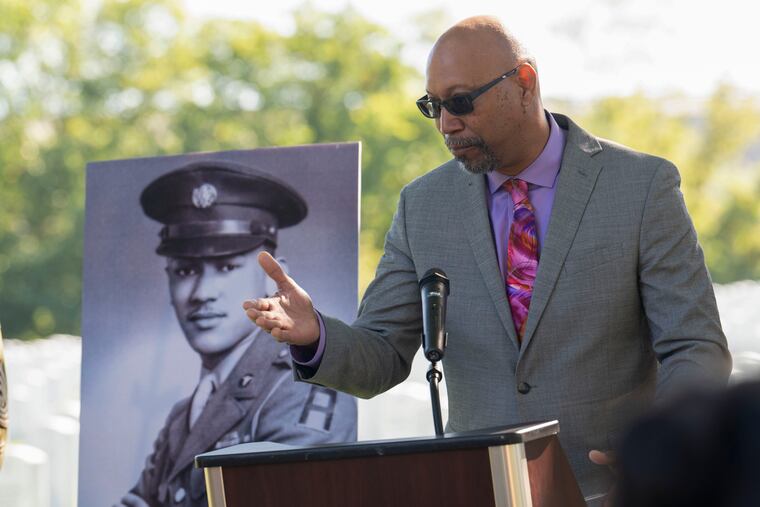For an African American hero of D-Day from West Philly, a long-overdue moment in the spotlight
Waverly B. Woodson Jr. treated 200 casualties on Omaha Beach. Segregation and racism largely prevented him from being honored. On Friday, a street in his old neighborhood is being renamed for him.

On the morning of Aug. 24, 1944, The Inquirer ran an article about a hometown hero.
The dateline was vague — “Somewhere in France” — but the story was detailed.
Army medic Waverly B. Woodson Jr., a 20-year-old Philadelphia native and Lincoln University premed student, had landed in D-Day’s first wave.
Severely wounded by German shelling, he “helped bandage and administer plasma and sulfa throughout the day and night, helped evacuate the wounded when the tide came in and continued first aid operations until 4:30 the second afternoon.”
The Army would credit him with treating 200 casualties on the deadliest stretch of the invasion beach before nearly collapsing from fatigue and blood loss.
A Pittsburgh Courier story about the Overbrook High School graduate ran days later. The headline: “Hero No. 1 of Invasion.”
Woodson, one of the few Black soldiers in D-Day’s first wave, may have been a household name in Pennsylvania for a brief time in 1944, but he and his heroism were largely forgotten in the ensuing decades.
That changes this week when the city of Philadelphia renames the street where Woodson was born and raised — North 58th Street — “Waverly Woodson Way.”
Woodson’s story has touched me personally. I, too, am a Philadelphia native, and I currently serve in First Army, the historic Army unit that led all ground and airborne forces on D-Day. On June 6, 1944, then-Cpl. Woodson’s shoulder bore the same block-A patch I wear on my uniform today.
For years, First Army has advocated for proper recognition of Woodson’s remarkable acts. It was announced last month, just a few days before the 80th anniversary of D-Day, that he would be posthumously upgraded to the Distinguished Service Cross, the military’s second-highest medal for bravery.
Some of our troops who were in France for commemoration events took the medal that will be presented to his wife, Joann, to Omaha Beach, and laid it on the sands where Woodson saved so many. The valor upgrade will come in Washington later this summer; the street renaming in Philadelphia will occur Friday afternoon.
I’ve thought a lot about what I want to say to my fellow citizens of Philadelphia as we honor Woodson. I want to acknowledge that it is long overdue for the Army to award Woodson’s gallantry. In 1944, that didn’t happen due to a perfect storm of realities: an Army segregated by race and riven by racism, the fog of war, lost records, and infighting among his leaders.
But I also want to point out that every time we tell Woodson’s story — every time we honor his service and sacrifice — we do our part to correct the injustices he endured on behalf of our great, but sometimes imperfect, nation.
Those of us who have had the responsibility of leading America’s sons and daughters in combat know one thing: We who wear the cloth of this nation are just ordinary citizens who love our country enough to do extraordinary things when that country calls. Woodson was an ordinary young man, from an ordinary Philadelphia street, who became extraordinary on a bitter, windswept morning that changed the course of human history.
Woodson was undoubtedly shaped by the city in which he was raised — the heart of colonial America where the Founding Fathers penned our most famous declarations to freedom and liberty — as well as a family with a true heart for military service. Even as Waverly fought his way onto Omaha Beach, his younger brother, Eugene, was an officer with the Tuskegee Airmen, the famed all-Black unit of military fighter pilots.
Merion Station resident Paul Newman and Philadelphia City Councilmember Curtis Jones Jr. undertook the effort to rename North 58th Street with one simple goal: to inspire a new generation of Americans by drawing attention to the actions of a member of the Greatest Generation. It is my hope that the young men and women who today walk the sidewalks of Waverly Woodson Way will know that they, too, can achieve extraordinary things.
In the Army, we often say we stand on the shoulders of giants. Woodson is one of our giants. He died in 2005 and was a First Army soldier eight decades ago, but we still consider him — and his family, many of whom still call Philadelphia home — our responsibility. It is our duty to ensure he is remembered.
Our thanks go to the city and people of Philadelphia for helping First Army do just that — and, even more, for raising the ordinary, extraordinary citizens who have fought for this nation from our earliest days, and who fight for us still.
Maj. Gen. Timothy Brennan is First Army’s deputy commanding general for support.